2024 ELECTIONS
SA youth not apathetic but no longer believe elections are best path to change
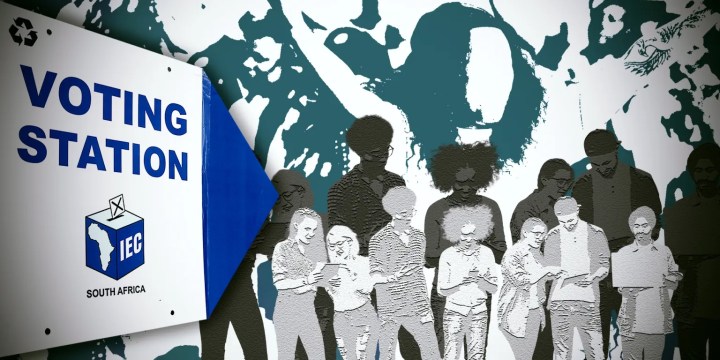
Your average ‘Gen Z-er’ has few memories of a politically functional South Africa — if any. It’s no wonder that this demographic has little taste for party politics and elections. However, it would be a mistake to assume that this makes them apathetic about the future of this country.
It is a well-known fact that youth voter turnout at elections tends to be low, despite 18- to 34-year-olds making up about a third of South Africa’s adult population. The question of how to arrest the decline in young voters has been debated in the lead-up to the last few national election days.
In the 2019 general election, only 19% of eligible 18- to 19-year-olds registered to vote and only 15% of this group actually voted. In the 20-to-29-year-old age group, 30% of people voted. The voter turnout across all age groups was 66%.
The poor voter turnout among young people has fed into the narrative put forward by some that young people are apathetic about politics and governance. “Voter apathy” is conflated with “youth apathy”. However, when Daily Maverick engaged with young South African activists, they argued that this couldn’t be further from the truth.
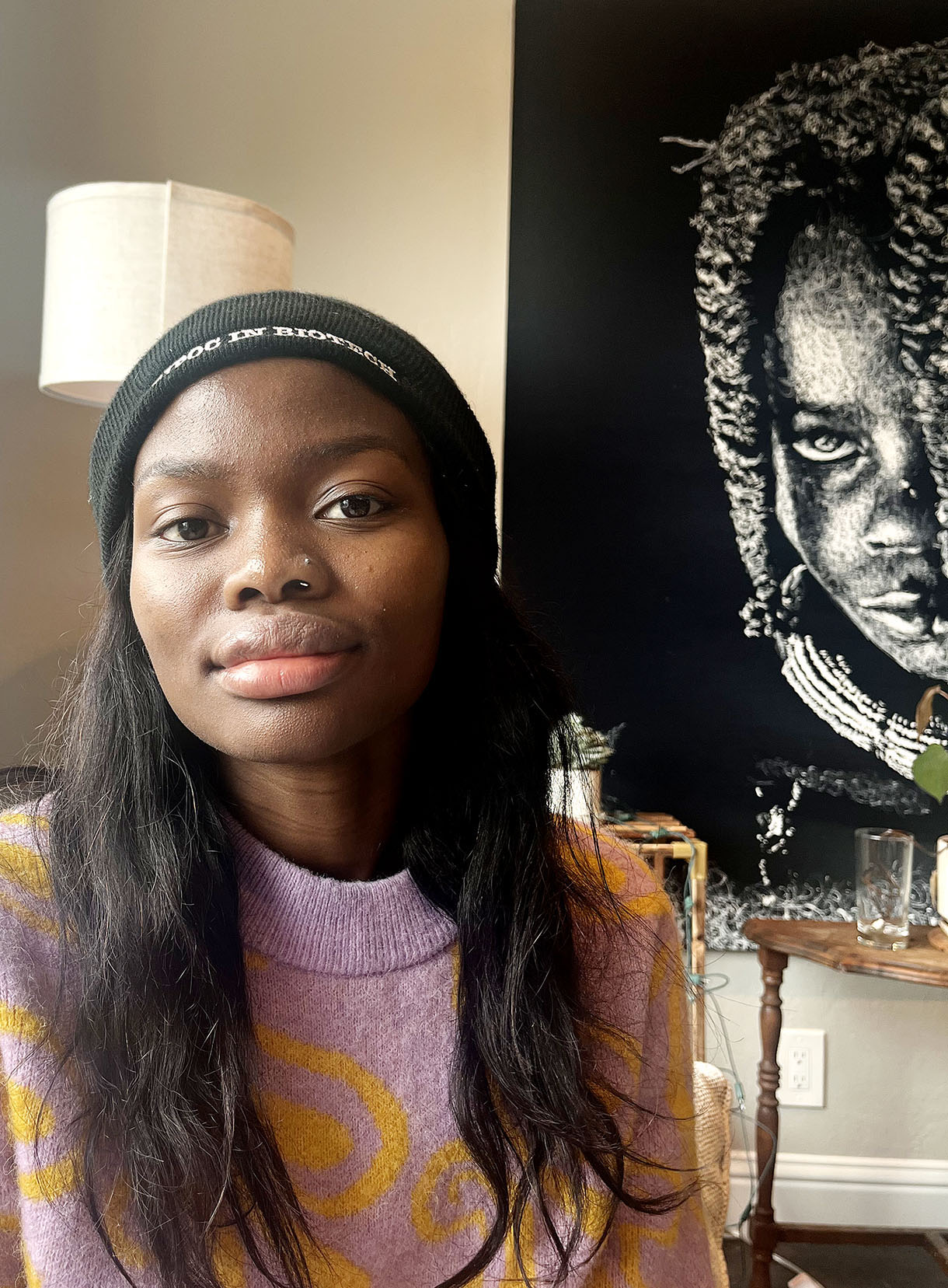
Fentse Malatji, digital strategist at Youth Capital. (Photo: Supplied)
Fentse Malatji (25), a young voter and digital strategist with the advocacy organisation Youth Capital, said, “Over the years, I’ve seen this narrative that young people are apathetic, that we don’t care about politics, we don’t care about our democracy — a democracy that our ancestors fought for. But I think that is categorically false.
“I talk to a lot of young people who are on the ground, filling the gaps and doing the work that government is supposed to be doing. They’re facing countless systemic challenges that they didn’t create for themselves, that they’re trying their best to fight against.”
Read more in Daily Maverick: SA youth ‘not apathetic’ but irked by poor delivery, coalitions, independent candidates — report
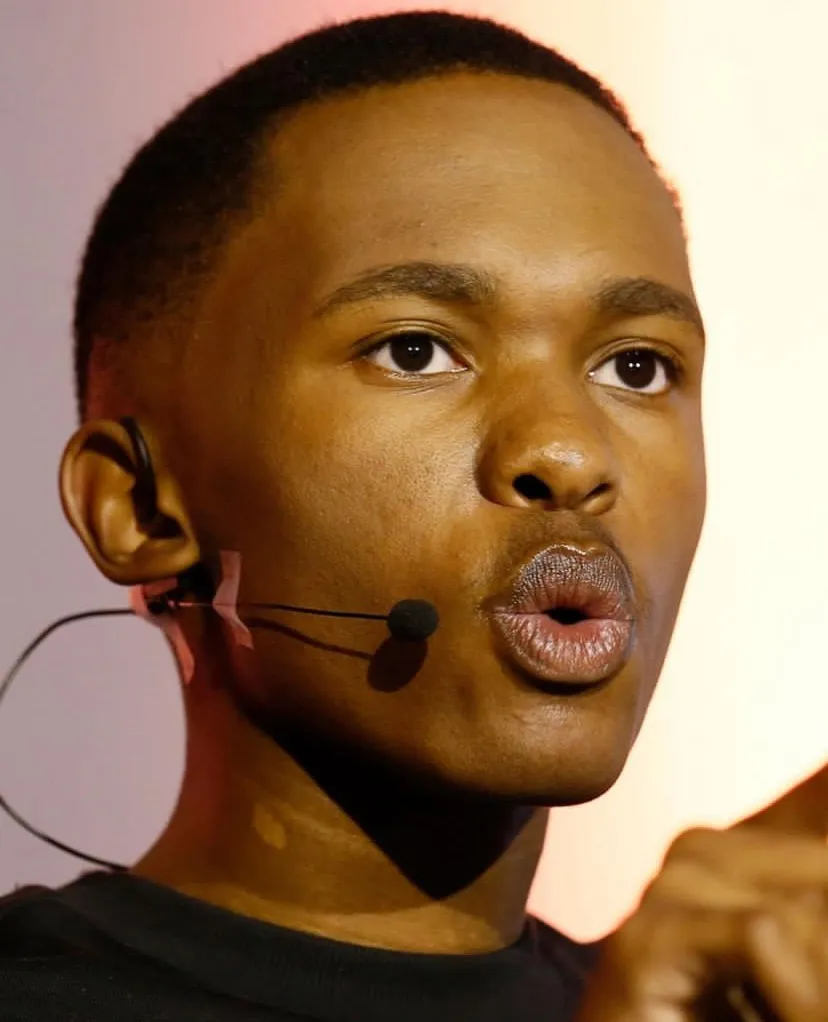
Otsile Nkadimeng, young activist and executive director of So We Vote. (Photo: Felix Dlangamandla)
Political disillusionment vs apathy
Otsile Nkadimeng (19) is a young climate activist and executive director of So We Vote, a Gen-Z-led advocacy group that aims to get more young people to register for the upcoming 2024 general election. Gen Z, or Generation Z, is the term used to describe people born during the late 1990s and early 2000s.
“I tried registering people at my own high school last year when I was in matric… and there’s been an incredible amount of backlash to it. People ask, ‘Why register? Why participate?’ But ultimately, you realise that you still need to make the case for it,” said Nkadimeng.
Read more in Daily Maverick: Meet the bold Gen Z learner who uses his break time at school for his climate activism
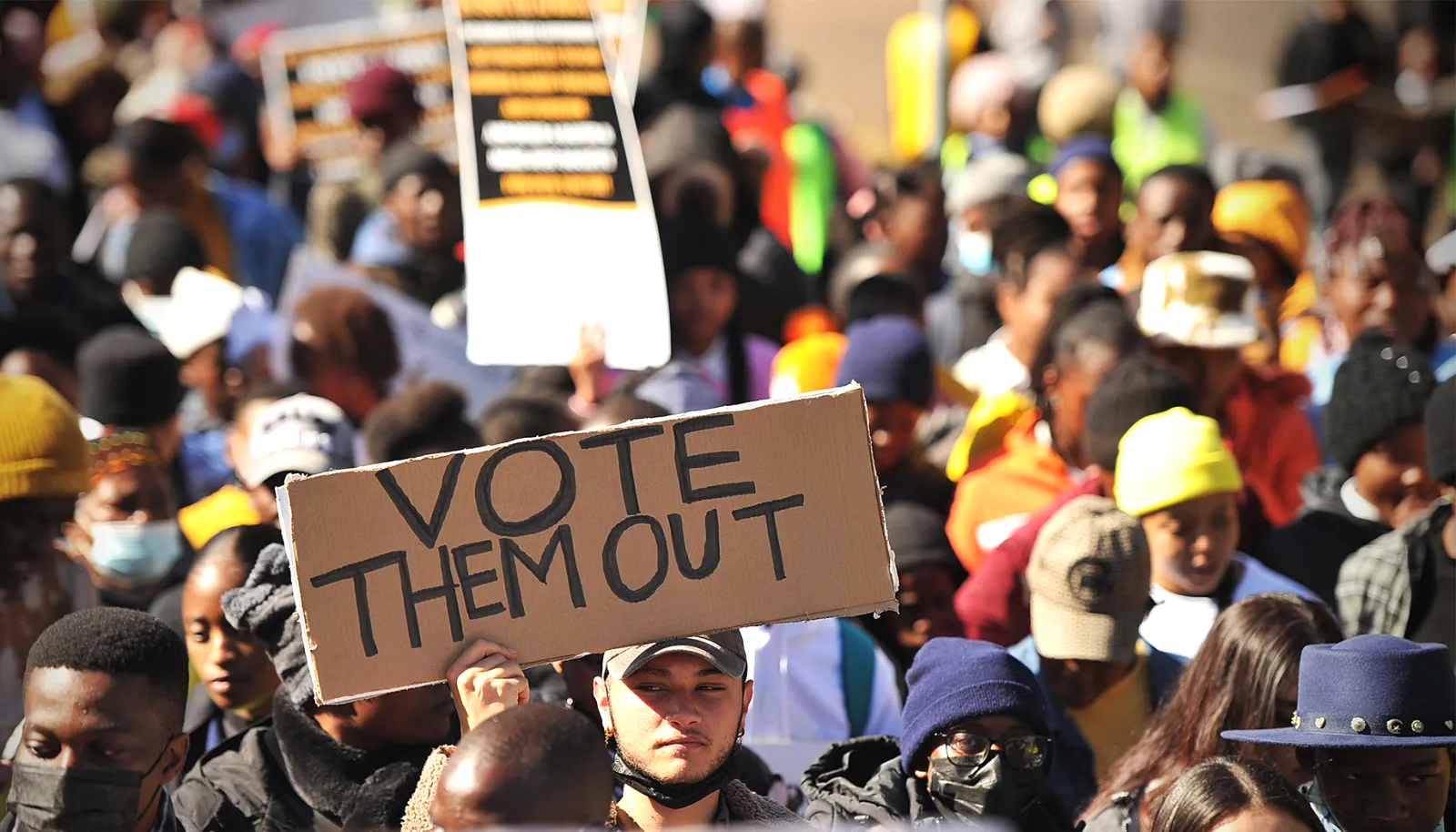
Young people ranging from school-age learners to students and young adults gathered at the Union Buildings in Pretoria on Youth Day to demand action from the government on issues such as unemployment, climate injustice, unequal education and gender-based violence. (Photo: Denvor De Wee)
There is a sense of “pessimism” about voting among young people, he said, as many don’t believe in it as a mechanism for change. He pointed out that people from his generation had no memories of a South Africa with “functional” politics.
“Our real introduction to politics… came from watching Fees Must Fall… then Zuma Must Fall, the Zuptagate, the firepool… crazy stuff. Nkandla and the introduction of Economic Freedom Fighters. My first memory of watching the State of the Nation Address was the chaos that unfolded in the boxing match between certain members [of Parliament] and the Parliamentary Protective Service,” remembered Nkadimeng.
“We’ve only ever known a South Africa with dysfunctional politics, a fractured state of politics… and so that, in some ways, has contributed to a sense of pessimism and a lack of interest in voting.”
According to Malatji, younger generations are tired of hearing empty promises in an environment with minimal political accountability. She described political parties as being “disconnected from the realities of young people”.
“A lot of the time, I would look out for policies that reflect young people and it’s been interesting, over the past few years, to see that young people aren’t really at the centre of political parties’ focus in terms of securing the future of South Africa,” she said.
However, both Malatji and Nkadimeng emphasised that feelings of political disillusionment among the youth were not the same as apathy. Malatji argued that while many young people weren’t heading to the polls, they were still finding other ways to make a difference in their communities.
This sentiment was echoed by Mbali Ntuli (35), CEO and founder of the Ground Work Collective, a community development initiative. One of the organisation’s focus areas is encouraging democratic participation.
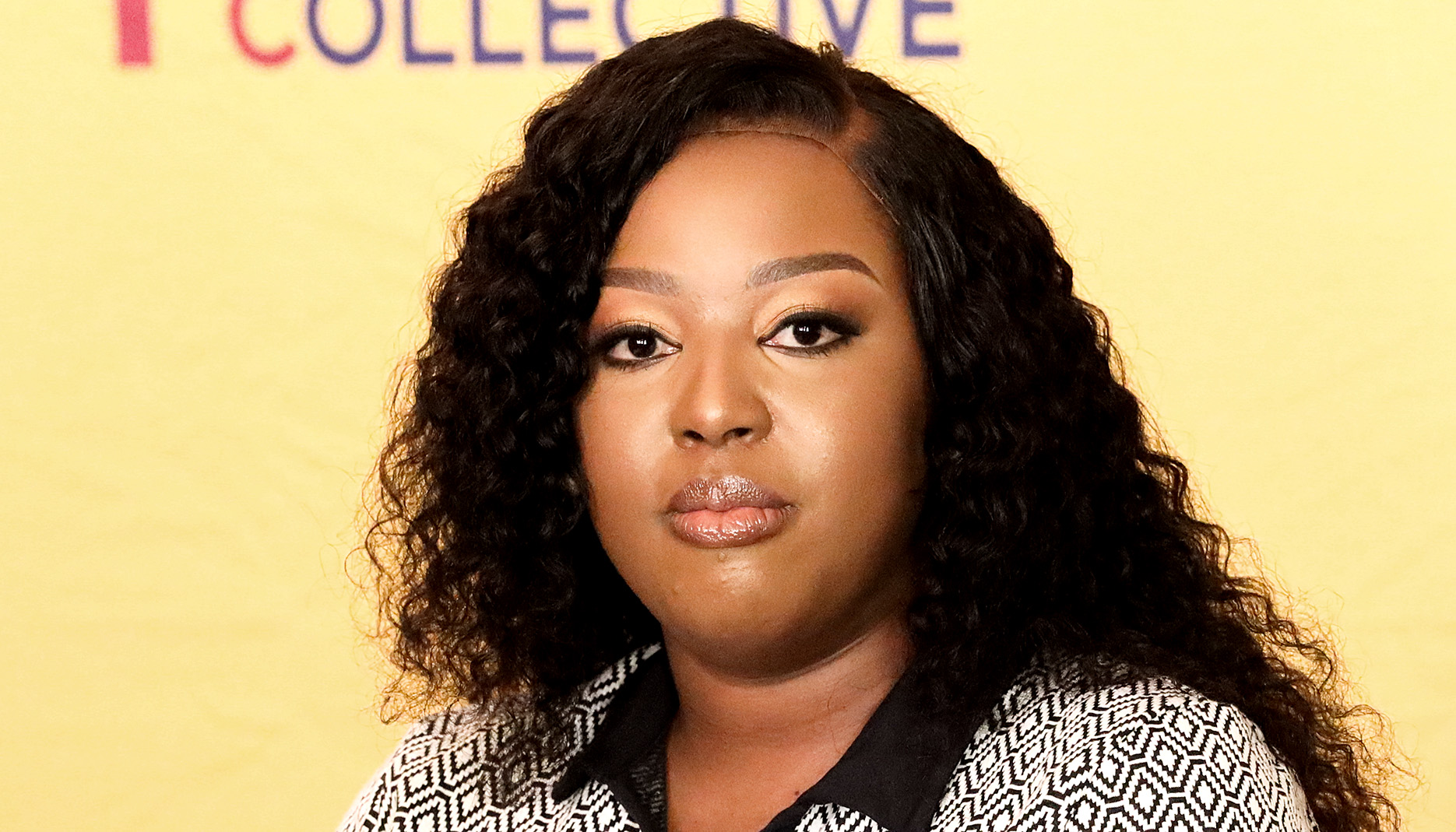
Mbali Ntuli (Founder of Ground Work Collective. (Photo: Gallo Images / Luba Lesolle)
“Young people… are very political in some cases, [just] not party political. We have protests every single day, but you also see a lot of young people getting involved in communities, doing community work… where they feel that they have some sort of agency and power,” she said.
Read more in Daily Maverick: ‘Alive, loud and proud’, Youth Day speakers invoke the spirit of ’76
Other avenues for change-making
One space in which young people play an active role is the civil society sector. This is because many of those who feel they have been “left behind” by the state see the resultant void being filled by community organisations and NGOs, according to Nkadimeng.
“In South Africa, when there’s a crisis — like wildfires or natural disasters — rather than call 10111 or… their local councillor, people call Gift of the Givers. When there’s an injustice happening, they don’t call… their elected officials to deal with this matter. They call the [Ahmed] Kathrada Foundation or the Helen Suzman Foundation because they see these organisations doing the work that their elected officials should be doing,” he said.
“The confidence that should be going into the state is going to the civic space… I trust NGOs more than I do my elected officials, because I’ve seen the NGOs actually do the work that the elected officials should be doing…
“That’s why I’m an activist. I believe as an activist, I can get more done than I can trying to be an elected official. Because as an activist… it’s more grassroots [action]. You can see the impact of your work and the people can hold you accountable for that.”
Many young people even start their own formal or informal groups in communities, looking to take on an active role in solving local problems, pointed out Malatji.
“Young people are actually doing the work and they’re creating these different ways of engaging with each other, where they solve problems. Because they understand that sometimes you message your ward counsellor and then three weeks later, you message again, and then it’s just this really long process,” she said.
Read more in Daily Maverick: Passionate youth activist shepherds Katlehong youngsters towards a brighter, safer future
Read more in Daily Maverick: Youth activist Jacques Bona’s tenacity opens the door to a world of learning for his community
Read more in Daily Maverick: Young poets explore new ways of talking about the shame and stigma of food insecurity
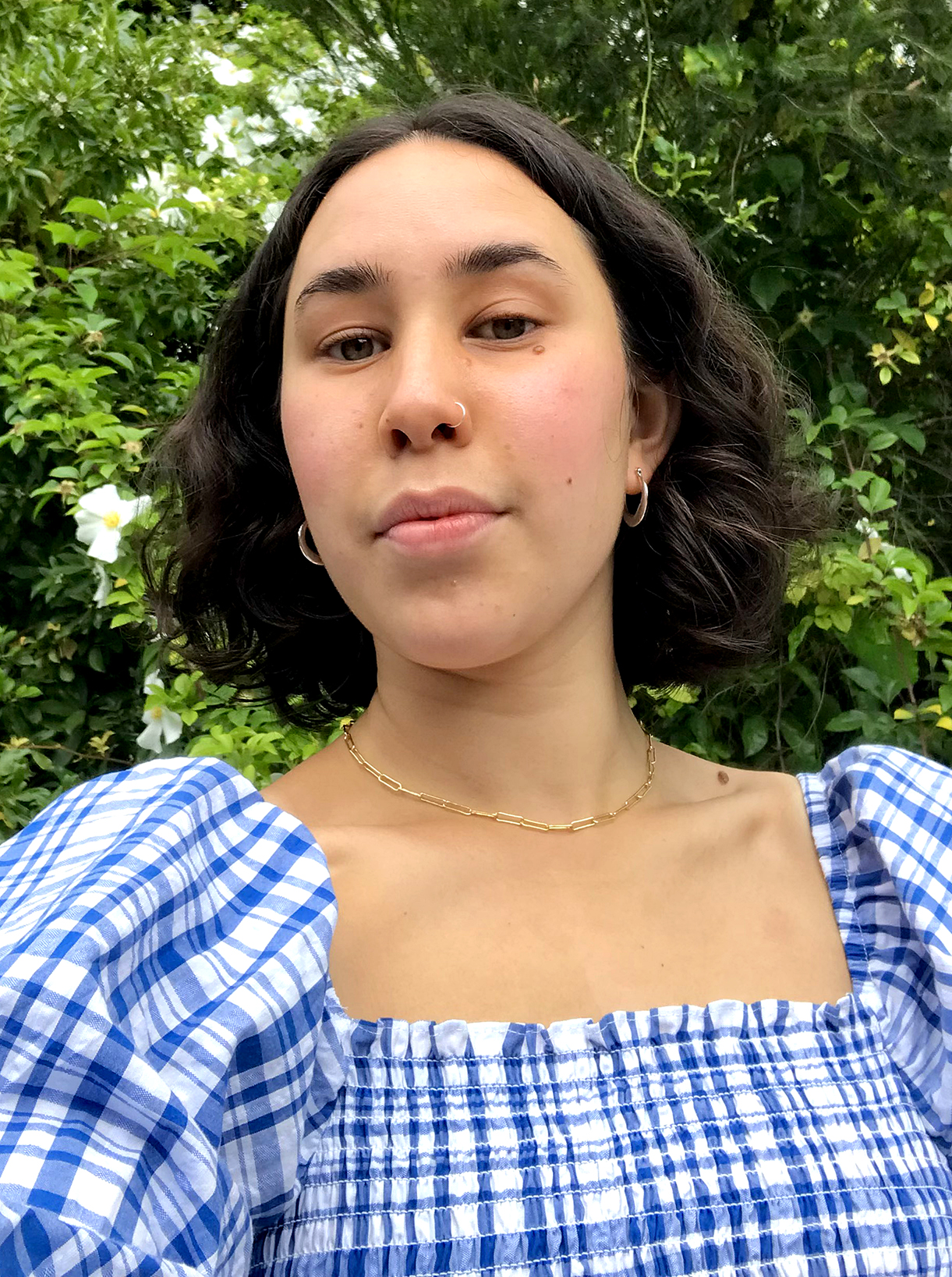
Stella Hertantyo, media and communications coordinator for the African Climate Alliance, spoke to Daily Maverick in her personal capacity as a young South African. (Photo: Supplied)
Stella Hertantyo (25), storytelling and communications coordinator with the youth-led climate justice organisation, African Climate Alliance, spoke to Daily Maverick in her personal capacity as a young voter. She explained that many young people were hungry for “immediate change”.
“I think that the mechanism for getting that is to act small and to act local. So, perhaps it’s really difficult to see how voting for political parties is going to change anything materially and tangibly within the immediate future… The grassroots space in South Africa is so active and makes me feel the most hopeful,” she said.
Other areas in which the youth are highly engaged are education and entrepreneurship, according to Dr Morne Mostert, one of the commissioners of the National Planning Commission and an international advisor on strategic foresight.
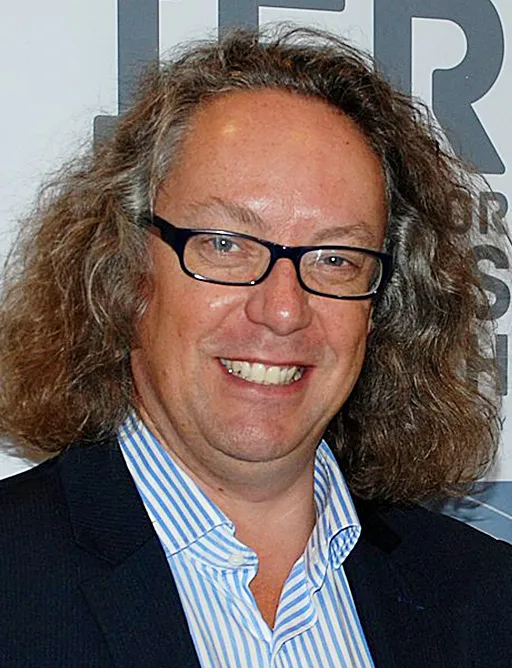
Morne Mostert. (Photo: Wikimedia Commons)
“If you look at, for example, the large number of technology hubs developing in South Africa, especially in Cape Town, these are all youth-driven. They’re not driven by older generations. So, in fact, it is the older generation that has the apathy towards entrepreneurship, which is one of the key drivers — as most people agree — for economic development,” he said.
Mostert said that young people should not “wait for government”, but rather should adopt a “21st century approach to activism”. He argued that the current political dispensation had an outdated system in which different institutions, such as government, business and labour, were too disconnected from one another.
“There’s an opportunity for young people to connect institutions… Millennials, and to an even larger degree Gen Z… think of community in a completely different way… My advice to young people would be to make the connections in society,” he said.
Boosting youth voter turnout
There is undoubtedly an appetite for change among young people, but is there a way to convince more of them that the electoral system is worth their time? According to Malatji, the sentiment that “2024 is our 1994” has been doing the rounds on social media, generating a “real energy” around the idea of using this election to get the country “back on track”.
“I think our political parties have lost the vision… so in terms of political parties and young people’s involvement in that… we’re looking out for people who have that energy… where they’re thinking of new ways to solve some of these problems,” she said.
Hertantyo said that in previous years, voting had felt like a case of picking “the best of a bad bunch”. However, the emergence of new kinds of parties, and even independent candidates, in the 2024 election had made her feel “more hopeful” than before.
According to Ntuli, one way of bringing more young voters on board is to meet them “where they are”, using forums with which they are familiar.
“One of the things that we do at Groundwork Collective is we use music, we use influencers. We use people that young people are interested in and we use events and things that they’ll want to come to, to start the initial conversation and to get them hooked at least on the concept [of registering to vote],” she explained.
In South Africa, there was a lack of civic education, Ntuli said. She added that this not only acted as a barrier to engaging in elections, but also prevented people from using political structures to hold government accountable in the years between elections.
“Without some kind of independent civic education… we’ve kind of left these young people at the mercy of political actors. And so they either become voting fodder or they just check out of the system because they are overwhelmed and not sure what to do about it, or they’re angry about it,” she said.
Ntuli advocated for a mass rollout of civic education that would empower people to engage with councillors, Integrated Development Plans and other structures designed to hold government agencies accountable from day to day.
“The best democracies in the world aren’t the ones that suddenly have great economic policies or great jobs. It’s the ones that have citizens who are actively involved and know how to make sure that they hold politicians accountable. That forces politicians to act and do things that are for the benefit of society,” she said. DM



















 Become an Insider
Become an Insider
No political party offers relevance to South African youth. That is the bottom line.
The countries future hangs in the balance at the next election, the youth could be the king makers. Let’s hope they apply themselves for their children’s futures.
I really wish the youth would snap out of their slumber when it comes to this! It is not them who by their activities and entrepreneurship dictate local and nationally important government policy, it is the government who they (should) vote into office that will do this, to HELP and ASSIST them in their ability to become well educated (not the current matric!), possess economic freedom to start businesses and create employment, and enjoy a robust environmental protection policy which is enforced! The more they think that they can achieve more “locally and through activism so they can achieve “things” immediately” is, in my view, a misguided belief, for it only will achieve that — and nothing on the scale of policy & governance in Pretoria, where it matters in the medium and long-term. What does it even matter if you have a business and employ several people as a young entrepreneur (through your “activism in other ways”), and the streets of your town are filthy, pests on the rise with it, educational institutions are still sliding downhill, water & electricity become a luxury when supplied, etcetera ad nauseum. If everyone has even the time to do this by themselves how can that be sustainable medium-long term for an entire country?? Answer: it cannot. Local effort and activism is to be lauded and is extremely important, but to do it without voting for a national government who are enablers to ensure a safe, productive, peaceful and robustly functioning economy, is absolute folly in my view.
This piece answers nothing. I don’t care if the youth don’t see any reason to vote or if it’s a “waste of time. The truth is that’s the current system. Get over yourselves and vote. It’s not that hard. Do it for the rest of us or at least for your country. Someday, there might be an alternate way to get your voice heard, but right now, voting is all you’ve got. Just do it.
Our current government, is setting the wrong examples to people of what Leaders should be about. to govern or lead or manage a country and its people, it is necessary that those in Leadership positions live the values and principles to establish ethical codes of respect. this government and politicians are not doing it and therefore alienate the youth, alternatively they youth become confused about what is right and what is wrong. they either take to drug abuse alternatively become delinquents and lose their self- respect. The question is who put these defunct leaders in their positions. The ruling political party who buys votes and advocate policies to deny people to think rationally. We need a drastic change in attitude and be honest about what is happening and leave our fears of retribution by the fake leaders, aside. We need a system and integrity to enable real Leaders to be put in place with our vote, not someone who is mainly interested in the salary. To lead is not a paid job but should be a vocation carried with honour and respect.
If you ask me as an adult to tell you the truth the ANC the party was founded as a liberation movement.
It easily took the position of being the all inclusive political party comfortable with leading a diverse nation (rainbow nation)
Individuals in the ANC corrupted the party to shambles and factions.
No other party has proven to beat the ANC in this regard.
The EFF still stands to be proven although we don’t know how they will manage taking from Peter and giving to Paul without creating havoc.
It’s easy being in opposition and making inflammatory statements.
Delivering is the issue and 5years of poverty and crime will break the camel’s back.